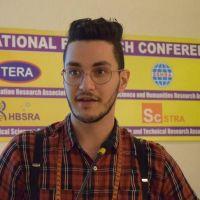What is it like to do a PhD as an international student in the UK
Algerian student Riadh Ghemmour shares his experiences of studying for a PhD abroad at a UK university
Share
I am an international doctoral researcher in education at the Graduate School of Education, affiliated to the╠řUniversity of Exeter╠ř(UK). In this blog, I would like to share my lived experience of doing a PhD at a British university with its ups and downs.
I did my BA and MA in Algeria at the University of Abdelhamid Ibn Badis (Mostaganem, Algeria). University has always been a space where I can learn, make mistakes, develop relationships and grow as an individual and a student.
I chose to pursue╠řa postgraduate research programme abroad because I have always dreamed of╠řexperiencing╠řhigher education in another country and embracing╠řthe complexity, tensions and beauty of international studies.
Transitioning from Algeria to the UK has been╠řchallenging╠řgiven the fact that they have two different education systems, policies, requirements and expectations which inform overall teaching, learning and assessment criteria. Adding to this is the╠řself-doubt and anxiety that comes with studying abroad - lots of what ifs.
Coming to a British institution I had to learn what teaching looked like at my new╠řuniversity and what was expected from me as an international PhD candidate in terms of contribution, integration, impact and sustainability.
Nine things to know before doing a PhD
Is it possible to do a three-year PhD as an international student?
What is a PhD? Advice for PhD students
PhD diary: Where do I begin?
It took me many months to navigate my own path in order to understand how the whole university ecosystem and structure functions in order to fit in. The support I received from other PhD fellows, academics, students, staff within the university and beyond was instrumental.
In addition, I struggled with academic writing. Although I was new to╠řthe UK back in 2016 and my academic English was fairly good, it needed lots of improvement to fit in the "academic scholarly conventions". Although there are many programmes and support services provided by universities to help international students enhance their academic writing abilities, I personally engaged in a self-teaching process to improve it myself.
Of course, my supervisors provided me with feedback on my written chapters, but I also found╠řreading, blogging, or email correspondence an effective way to understand how to write. Therefore, practice made me better (not perfect as I believe╠řthere is no perfection in writing!). It is an unfinished process which requires hard work, commitment and practice.
Furthermore, pursuing postgraduate research studies can be a lonely journey as you are in your╠řown╠řbubble and nobody understands what you╠řare trying to achieve (maybe not even yourself!). Working on a research project on your own for a number of years where you have to motivate and monitor your own progress and learning is hard work.
So╠řit is essential to stay connected to the PhD community and find other students╠řand staff members╠řwho╠řspeak the same academic╠řlanguage as you.╠řFinding this genuine support and solidarity are so needed when doing a PhD and this is how I could build the momentum and keep going with my research.╠ř
I feel less alienated and alone in this journey as I have wonderful colleagues and friends who show support although their busy schedules and who I collaborate with in various student-led and charitable projects within the university. It is all about how we balance our own commitments while staying connected to the wider university initiatives and opportunities to grow and make connections.
I am aware of my privilege of undertaking postgraduate research studies especially abroad. Although university life can bring stress and anxiety, we can make university╠ř an enjoyable learning experience through building a community.╠ř
Read more:╠řTransitioning from a non-Western university to a Western one: highs and lows
╠ř


